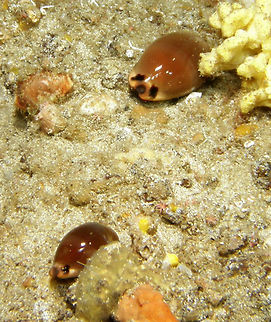
Appearance
The shells of ''Luria lurida'' reach on average 40–48 millimetres of length, with a minimum size of 14 millimetres and a maximum size of 66 millimetres . The dorsum surface of these elongated, smooth and shiny shells is mainly pale brown or reddish, with three transversal darker bands alternating with narrower clearer bands. At the extremities of the shell there are two separate dark brown spots. The aperture is wide, with several teeth. In the living cowries the mantle is dark brown and may cover the entire shell. The male is usually smaller and elongated than the female.Naming
Three subspecies have been recognized :⤷ ''Luria lurida pulchroides'' Alvardo & Alvarez, 1964
⤷ ''Luria lurida lurida''
⤷ ''Luria lurida minima''
Distribution
This common species is distributed in Mediterranean Sea and in the seas along Cape Verde, Azores, Canaries and West Africa, mainly in Senegal and Angola.Habitat
As they fear the light, during the day usually they hide themselves in small caves, crevices or under rocks up to about 40 metres of depth. They live on rocky seabed and corals, feeding during the night mainly on sponges of ''Verongia aerophoba'', ''Aiplysina aerophoba'', ''Chondrilla nucula'' and ''Tethya aurantium''.References:
Some text fragments are auto parsed from Wikipedia.